Speakers
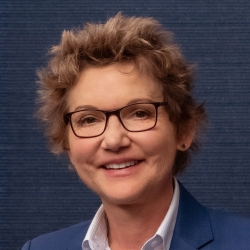
Mary C. Daly
President and Chief Executive Officer
Federal Reserve Bank of San Francisco
Mary C. Daly leads the Federal Reserve Bank of San Francisco, the largest and most diverse Federal Reserve District, home to one-fifth of the nation’s population. In this role, Daly charters a vision of the Bank as a premier public service organization dedicated to promoting an economy that works for all Americans and supporting the nation’s financial and payment systems. She is at the forefront of the Federal Reserve System’s price stability and full employment mandates as a member of the monetary policy-setting Federal Open Market Committee.
Daly assumed leadership of the San Francisco Fed in October 2018, building on a distinguished career at the Bank that began in 1996. Starting as an economist specializing in labor market dynamics and economic inequality, she has since served as research advisor, vice president and head of macroeconomics, senior vice president and assistant director of research, and executive vice president and director of research.
Daly earned a Ph.D. from Syracuse University, a master’s degree from the University of Illinois Urbana-Champaign, and a bachelor’s degree from the University of Missouri-Kansas City. She also completed a National Institute of Aging post-doctoral fellowship at Northwestern University.
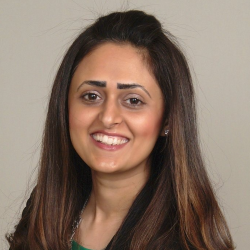
Sunayna Tuteja
Chief Innovation Officer
Federal Reserve System
Sunayna joined the Federal Reserve System in 2021 as its first Chief Innovation Officer. With a bias for action, she leads the Fed's innovation agenda, in collaboration with business and technology partners to strengthen innovation culture across the 12 Reserve Banks and the Board of Governors, and to ship meaningful outcomes that deliver value to the constituents and communities that the Federal Reserve System serves. The System Innovation team lead the Fed’s interrogation of frontier technology, both in assessing the potential application within the Fed and to guide the policy making. Sunayna also leads the Fed’s Central Bank Digital Currency (CBDC) research and development program and the System GenAI Incubator. Sunayna brings 10+ years of global experience leading change and innovation at the nexus of finance, technology and policy. Prior to the Fed, she advanced digital transformation as a builder, operator and venture investor within the fintech and crypto ecosystem in North America and Asia. She is a proud alumna of the University of Alberta and Stanford University. When she’s not nerding out on all things innovation, you can find Sunayna adventuring the skies in her Cessna.
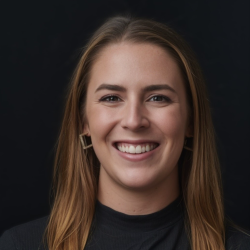
Mollie Markham
Program Specialist
Federal Reserve Bank of Chicago
Mollie Markham is an accomplished industry relations program specialist for Federal Reserve Financial Services (FRFS), responsible for cultivating relationships among industry leaders to drive advancements in the U.S. payment system. Mollie leads various industry feedback and collaboration opportunities to inform strategic initiatives across FRFS, which serves more than 9,000 financial institutions nationwide. Charged with driving broad payment improvements and instant payment adoption, she has successfully facilitated industry work groups, built educational programs, and developed impactful industry events. Mollie joined the Federal Reserve in 2017 and received a bachelor’s degree from University of Wisconsin, Madison, and a master’s in economics and policy analysis from DePaul University.
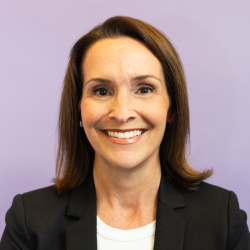
Tamara Romanek
Head of Partnerships
Plaid
Tamara leads the partnership program at Plaid across payments and digital finance more broadly. She is an industry veteran with a proven track record in developing and implementing payments, financial services products, and partnership programs that drive growth. Prior to Plaid, Tamara served in various leadership roles for Meta, Visa, Chase, and Netspend.
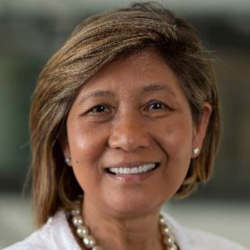
Julapa Jagtiani
Senior Economist Advisor and Economist
Federal Reserve Bank of Philadelphia
Julapa is Senior Economic Advisor and Economist at the FRB Philadelphia, a Central Bank Research Fellow at the BIS, and a Fellow member of the Wharton Financial Institutions Center. At the Fed, Julapa has participated in several supervisory policy initiatives, including Basel qualification, CCAR stress testing, and more recently fintech supervision program. Julapa has published influential research articles in top academic journals, including the Journal of Financial Economics; Journal of Money, Credit, and Banking; Journal of Banking and Finance; Financial Management, Journal of Financial Services Research, and Journal of Financial Stability. Julapa also leads the efforts at the Philly Fed in organizing the Annual Fintech Conferences to bring together world renowned experts to discuss fintech innovations, cryptocurrencies; realtime payments; DeFi; AI; quantum computing; and potential policy solutions. Julapa has a PhD in Finance and an MBA from NYU Stern School of Business, where she held the Rockefeller Foundation Fellowship.

John de New
Research Fellow
Melbourne Institute of Applied Economic & Social Research, University of Melbourne
Professor John de New leads the Melbourne Institute’s “Financial Wellbeing” research team and attracts industry funding. He has published in many top-ranking journals, including American Economic Review, Review of Economics and Statistics, Journal of Human Resources, Journal of Economic Behavior & Organization, and Economic Journal. John’s work focuses on financial wellbeing, health economics, education economics, subjective wellbeing. He is a senior Economist (RePEc Rank top 4% in Australia, top 6% worldwide) at the Melbourne Institute, University of Melbourne. He did his doctorate in Economics at the University of Munich, Germany on the topic of migration and labour economics.
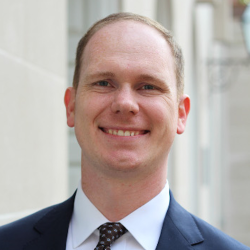
Daniel Sullivan
Research Lead
JP Morgan Chase Institute
Daniel M. Sullivan is an economist and research director at the JP Morgan Chase Institute where he leads research on topics in household finance, including household financial resiliency, student debt, and the effects of climate change on households. Before joining JP Morgan Chase, he was a research fellow at Resources for the Future where he studied the economic effects of pollution and environmental gentrification. He earned a Ph.D. in Economics from Harvard University and a bachelor's degree in Mathematics and Economics from Brigham Young University.
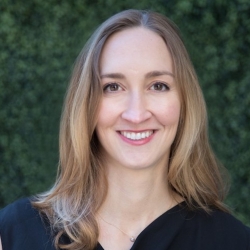
Ashley Lannquist
Digital Finance Expert
International Monetary Fund
Ashley Lannquist is a Digital Finance Expert in the International Monetary Fund (IMF) Digital Advisory Unit, focusing on central bank digital currency (CBDC). Prior to the IMF, she led the CBDC work at the World Economic Forum (WEF) from 2018-2021, including the WEF’s “CBDC Policy-Maker Toolkit.” At the WEF, Ashley was a Project Lead on the Blockchain and Digital Assets team, where she also managed multiple projects related to blockchain and cryptocurrency. She has an MBA from UC Berkeley’s Haas School of Business, where she founded and led the Haas Fintech Club. Ashley has a BA with honors in Economics and European Studies from Barnard College of Columbia University. Ashley is also a member of the Bank of England’s CBDC Technology Forum, the WEF’s expert community on wholesale CBDC, and American Mensa.

Andrew Gallucci
Director for Regulatory Strategy
Circle
Andrew Gallucci is the Director for Regulatory Strategy at Circle where he supports the development and implementation of emerging global prudential, anti-money laundering, and other standards around digital assets. Prior to Circle, Andrew led the U.S. Treasury Department’s development of policies on illicit finance, cross-border payments, and financial access in Africa and the Middle East, including on issues related to virtual assets and financial technology. Andrew previously served in various foreign policy capacities across the U.S. government, including doing overseas tours in the Middle East and Europe.

Joanna Wisniecka
Senior Engagement Manager
Glenbrook Partners
Joanna has over fifteen years of experience in payments with expertise in strategy and policy, as well as product and program management. She provides Glenbrook’s clients with a broad perspective drawn from her experience in regulatory oversight, payments infrastructure management, and product roadmap development. Joanna spent fourteen years at the Federal Reserve Bank of New York. There she worked in the Bank Supervision Group overseeing large financial institutions’ payments processing activities, in the Payments Policy Group coordinating a central bank-led industry Task Force, and in Fedwire Securities and Funds Service, leading strategy, product management, and participant engagement. In this capacity, she also contributed to business case analysis for a U.S. central bank-operated fast payments system.
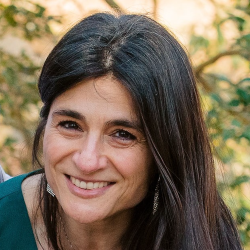
Francesca Carapella
Principal Economist
Board of Governors of the Federal Reserve System
Francesca is a Principal Economist with the Federal Reserve Board, in the Financial Stability Research Division. While at the Board, Francesca has also worked in the Payment Systems Studies section, and with the Monetary Affairs Division, conducting research on topics related to central clearing, macroeconomic and monetary theory, banking and financial institutions, central bank digital currency, stablecoins, and tokenization. Prior to joining the Federal Reserve Board in 2009, Francesca received her Ph.D. in economics from the University of Minnesota and was an assistant professor at the Einaudi Institute for Economics and Finance (EIEF, Italy). Francesca has been also an adjunct professor at Georgetown University, Carnegie Mellon University, the University of Bern (Switzerland), LUISS University (Italy), teaching both master and Ph.D. students.

Nathan Swem
Principal Economist
Board of Governors of the Federal Reserve System
Nathan Swem is a Principal Economist with the Federal Reserve Board, and he works in the Financial Stability Research Division. Prior to joining the Federal Reserve Board in the summer of 2016, Nathan received a Ph.D. in Finance from the University of Texas. Prior to pursuing his Ph.D. Nathan worked in the finance industry for eleven years: first as a sell-side research analyst for Goldman Sachs and then as a buy-side research analyst for a hedge fund.
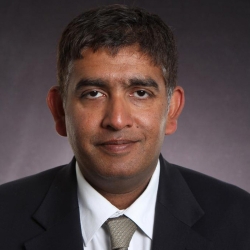
Eugene Sivadas
Dean
Lam Family College of Business, San Francisco State University
Eugene Sivadas is the Dean of the Lam Family College of Business. He spent 15 years on the faculty of the Milgard School of Business at the University of Washington, Tacoma where he held appointments as Associate Dean of Academic and Student Affairs, Director of the MBA Program, Coordinator of the Master’s Program in Cybersecurity & Leadership and Professor of Marketing. He also served on the University of Washington Faculty Senate, on the executive council of UW Tacoma’s Faculty Assembly, as Chair of Milgard School’s faculty council and as Chair of UW Tacoma’s Appointment, Promotions, and Tenure Committee. He holds a Ph.D. in marketing from the University of Cincinnati and has held faculty appointments at Rutgers Business School, the University of Cincinnati, and Emerson College. Professor Sivadas has published in leading marketing journals including the Journal of Marketing, Journal of the Academy of Marketing Science, Marketing Letters, Journal of Business Research, Industrial Marketing Management etc. and has recently co-authored the 9th edition of the leading marketing channels textbook. His research has been cited more than 5,000 times.

Ani Narayan
Product Lead, Payments
Modern Treasury
Ani leads the Payments product at Modern Treasury, with a key focus on building payment operations infrastructure for Instant Payments and driving adoption among corporates. Prior to Modern Treasury, Ani was on the early Product and Growth team at Microsoft Teams, and studied Computer Science at UCLA.
Moderators
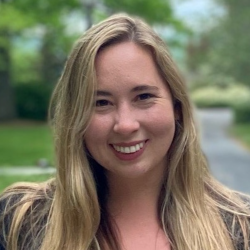
Julia Godinez
Fintech Risk & Policy Advisor
Federal Reserve Bank of San Francisco
Julia Godinez is a Fintech Risk and Policy Advisor at the Federal Reserve Bank of San Francisco where she focuses on monitoring complex bank/fintech partnerships and Artificial Intelligence/Machine Learning (AI/ML) risk. Prior to joining the FRBSF, Julia was a Large Institution Lead Examiner at the Federal Reserve Bank of New York. Before joining the Federal Reserve System, she served in the Peace Corps in Guatemala. Julia holds an MPA in economic and financial policy from Cornell University and degrees in economics and history from Mount Holyoke College.

Nirvikar Singh
Distinguished Professor of Economics and Co-Director of the Center for Analytical Finance (CAFIN)
University of California, Santa Cruz
Nirvikar Singh is a Distinguished Professor of Economics at the University of California, Santa Cruz, where he also co-directs the Center for Analytical Finance. He has been a member of the Advisory Group to the Finance Minister of India on G-20 matters; a consultant to the Chief Economic Adviser, Ministry of Finance, Government of India; and a member of an Expert Group of the Government of Punjab for revitalizing the state’s economy.

Todd Feldman
Professor of Finance and Lam-Larsen Fintech Initiative Director
Lam Family College of Business, San Francisco State University
Todd Feldman is a Professor of Finance at San Francisco State University, where he directs the Lam-Larsen Fintech Initiative. Todd teaches the Fintech Fellowship Program at SF State. He is also an advisor to the San Francisco Foundation Board. Todd’s research centers around behavioral finance, fintech, and agent-based modeling.
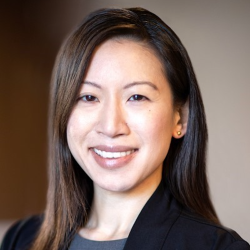
Jess Chang
Payments & Fintech Partner
Wilson Sonsini
Cheng has more than a decade of experience handling—and shaping—the regulatory aspects of a broad range of payment services and technologies, spanning traditional systems and cutting-edge payments products. She joins Wilson Sonsini from the Board of Governors of the Federal Reserve System in Washington, D.C., where she served as senior counsel in the Monetary Affairs and Payment Systems Section. While there, Cheng was at the forefront of payments rulemaking, including with respect to debit card interchange fees and instant payments, as well as oversight of the FedNow Service. Cheng has extensive expertise advising on the evolving financial regulatory perimeter, particularly with regard to stablecoins and nonbank payment companies; partnerships between banks and fintech companies, including in connection with payment infrastructures that leverage distributed ledger and other emerging technologies; and the legal, regulatory, and public policy aspects of central bank digital currencies. Previously, as deputy general counsel at enterprise blockchain company Ripple, Cheng advised on a wide range of legal and regulatory issues that affect innovative payment products.
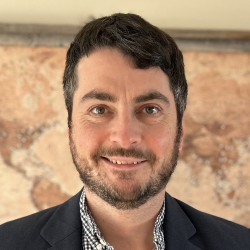
Sean Creehan
Lead for Financial Health, Inclusion & Technology
Federal Reserve Bank of San Francisco
Sean is the lead for financial health, inclusion and technology at the Federal Reserve Bank of San Francisco. He is currently leading Federal Reserve System efforts to enable safe and fair uses of alternative data in credit underwriting and separate research into the role financial health measurement may play in the Fed’s assessment of financial products designed to promote inclusion. During the COVID-19 crisis, Sean led a team of economists, bank supervisors, and community development specialists that innovated policy supports for small businesses. He previously worked as an economist within the SF Fed’s Country Analysis Unit, where he researched innovative uses of policy and technology to build inclusive financials systems in Asia and served as advisor to the SF Fed’s Management Committee. Before joining the Fed, Sean worked as a management consultant to companies operating and investing in Asia. Sean holds a master’s in international economics from Johns Hopkins School of Advanced International Studies and a bachelor’s in social studies from Harvard College. He spent a postgraduate year as a Harvard-Yenching Scholar at Peking University and speaks Mandarin Chinese and Indonesian. He holds the designation of Chartered Financial Analyst and is a term member of the Council on Foreign Relations.

Erin English
Novel Activities Monitoring
Federal Reserve Bank of San Francisco
Erin English is a member of the SF Fed and is also part of the Federal Reserve's Novel Activities Supervision Program, with a particular focus on digital assets and blockchain technology. Prior to joining the Fed, Erin was part of Visa’s Global Government Engagement team, a founding fellow of the Visa Economic Empowerment Institute, and was also a member of Microsoft’s Trustworthy Computing public policy team. He previously served for the better part of a decade in the U.S. Department of Treasury in the Office of Terrorism and Financial Intelligence and as the Department’s Financial Attaché in Pakistan during the global financial crisis. Erin holds a master’s degree from the Fletcher School of Law and Diplomacy at Tufts University and a bachelor’s degree in history from the U.S. Military Academy at West Point.
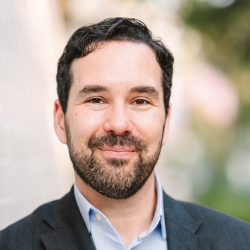
Alex Zerden
Founder and Principal
Capitol Peak Strategies
With experience as a regulatory lawyer, economic policymaker, and financial diplomat, Alex Zerden leads Capitol Peak Strategies, a risk advisory firm that helps organizations navigate complex regulatory, legal, and public policy issues. At Capitol Peak, Alex leverages his extensive public and private sector experiences at the intersection of financial services, national security, and law to provide strategic advice and analysis on financial regulation and legislation, economic sanctions, AML/CFT, anti-corruption, financial enforcement and oversight investigations, economic crisis response, and public-private partnerships. Alex previously worked across the U.S. government at the White House National Economic Council, Department of the Treasury, and Congress. He is also a Council on Foreign Relations Term Member, an Adjunct Senior Fellow at the Center for a New American Security (CNAS) in the Energy, Economics, and Security Program, and a Senior Advisor to WestExec Advisors.

Paresh Dave
Senior Writer
WIRED
Paresh Dave is a senior writer for WIRED, covering the inner workings of big tech companies. He writes about how apps and gadgets are built and about their impacts, while giving voice to the stories of the underappreciated and disadvantaged. He was previously a reporter for Reuters and the Los Angeles Times, and an investigative reporting fellow at the Maynard Institute for Journalism Education. His work has tackled topics as varied as esports, Olympics baseball, and diversity and ethics in the tech industry. His team reporting on Snapchat’s IPO was recognized by the Society for Advancing Business Editing and Writing. He is a lifelong Californian.